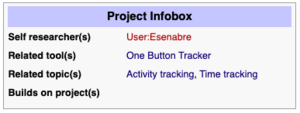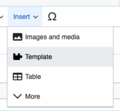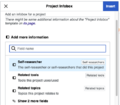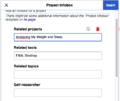Difference between revisions of "Help:How to make a Project page"
| Line 1: | Line 1: | ||
This wiki offers a couple of templates that help maintain a consistent style, categorization and automatic linking through semantic information. If you want a new page to be a ''Project'' page, the minimum information you need to add is the categorization as a project. All other templates are optional, though we strongly encourage using them to improve findability. | This wiki offers a couple of templates that help maintain a consistent style, categorization and automatic linking through semantic information. If you want a new page to be a ''Project'' page, the minimum information you need to add is the categorization as a project. All other templates are optional, though we strongly encourage using them to improve findability. | ||
| + | |||
| + | ==Elements of a Project page== | ||
| + | |||
| + | <gallery widths=300px> | ||
| + | File:Category-projects-tag.png|Category-projects-tag.png|The category tag: A tag that assigns your page to the "Projects" category. | ||
| + | File:Project-infobox-example.png|An infobox: A template in which you can add titles of related topic, tool and people pages as semantic properties. This will make your project pages show up in the infobox of the respective pages. "Has inspired" lists projects that have added this project to their infobox. | ||
| + | </gallery> | ||
== Using the visual editor to add project templates to a page == | == Using the visual editor to add project templates to a page == | ||
| Line 28: | Line 35: | ||
** You can enter a list of people who worked in this project (after "Self researchers="), tool (after "Related tools="), and topic pages (after "Related topics="), separated by commas. For example: <code><nowiki>{{Project Infobox|Self researchers=User:YOURUSERNAME |Related tools=One Button Tracker, Oura Ring |Related topics=Sleep tracking }}</nowiki></code> | ** You can enter a list of people who worked in this project (after "Self researchers="), tool (after "Related tools="), and topic pages (after "Related topics="), separated by commas. For example: <code><nowiki>{{Project Infobox|Self researchers=User:YOURUSERNAME |Related tools=One Button Tracker, Oura Ring |Related topics=Sleep tracking }}</nowiki></code> | ||
** We recommend putting this at the top of your page article | ** We recommend putting this at the top of your page article | ||
| − | |||
| − | |||
| − | |||
| − | |||
| − | |||
| − | |||
| − | |||
| − | |||
| − | |||
==How to turn a page a project page if it already in a different category?== | ==How to turn a page a project page if it already in a different category?== | ||
You can change the categorization of a page by removing any existing infobox/footer templates and category tags from a page and instead replace with (at least) the project category tag as specified above. This will put the page in the project category and remove it from the other categories. | You can change the categorization of a page by removing any existing infobox/footer templates and category tags from a page and instead replace with (at least) the project category tag as specified above. This will put the page in the project category and remove it from the other categories. | ||
Latest revision as of 14:17, 2 March 2023
This wiki offers a couple of templates that help maintain a consistent style, categorization and automatic linking through semantic information. If you want a new page to be a Project page, the minimum information you need to add is the categorization as a project. All other templates are optional, though we strongly encourage using them to improve findability.
Elements of a Project page[edit | edit source]
Using the visual editor to add project templates to a page[edit | edit source]
Depending on how you ended up on the page creation form the visual editor should already be the default. Otherwise, the visual editor can be found under the "Create" tab on the top right/middle of the page. A step-by-step guide of how to add all the right templates and information can be seen in the galleries below.
Adding the category[edit | edit source]
Adding the infobox[edit | edit source]
Now you can add lists of related pages, separated by commas. As of now, there is no autocomplete option for that. If you are not sure about the title of the pages you want to link to, you can verify them on the respective category overview pages. Click "Insert". The infobox should now appear on the right of your page.
Adding further content[edit | edit source]
All other content can now be added and formatted as you wish. See the Cheatsheet from MediaWiki for formatting help.
Using the source code editor to add project templates to a page[edit | edit source]
- Adding the projects category:
[[Category:Projects]]- We recommend adding this at the bottom of the page,
- This makes the page show up on the Projects overview page
- Adding the infobox:
{{Project Infobox|Self researchers= |Related tools= |Related topics= }}- You can enter a list of people who worked in this project (after "Self researchers="), tool (after "Related tools="), and topic pages (after "Related topics="), separated by commas. For example:
{{Project Infobox|Self researchers=User:YOURUSERNAME |Related tools=One Button Tracker, Oura Ring |Related topics=Sleep tracking }} - We recommend putting this at the top of your page article
- You can enter a list of people who worked in this project (after "Self researchers="), tool (after "Related tools="), and topic pages (after "Related topics="), separated by commas. For example:
How to turn a page a project page if it already in a different category?[edit | edit source]
You can change the categorization of a page by removing any existing infobox/footer templates and category tags from a page and instead replace with (at least) the project category tag as specified above. This will put the page in the project category and remove it from the other categories.






